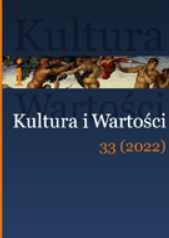Błąd naturalistyczny a problem praktyki
Naturalistic Fallacy and the Question of Practice
Author(s): Piotr JaskółkaSubject(s): Metaphysics, Ethics / Practical Philosophy, Early Modern Philosophy, 18th Century
Published by: Wydawnictwo Naukowe Uniwersytetu Marii Curie-Sklodowskiej
Keywords: naturalistic fallacy; Hume’s Law; Hume’s guillotine; is-ought gap; practical philosophy; good; values; Hume; Moore; metaethics;
Summary/Abstract: The article contains a critical analysis of D. Hume’s Law from A Treatise of Human Nature and G.E. Moore’s naturalistic fallacy formulated in Principia Ethica. Due to the indicated shortcomings, neither Hume’s nor Moore’s position is capable of constituting a satisfactory theory of naturalistic fallacy. Whilst Hume’s opinion on the subject-matter only appears on the margin of his considerations and is merely an expression of his intuitions, Moore’s position aspires to become a theory of fallacy. The diagnosis of Moore’s failure at formulating a theory is as follows: the so-called naturalistic fallacy may be based on an unjustifiable abolition of the division between theory and practice. Moore’s theoretical efforts constitute an example of the ineffectiveness of attempts at defining good theoretically. Moore’s rejection of the division between theory and practice connected to a psychological interpretation of Kant (then dominant), resulted in an inevitable failure to formulate a theory. If this diagnosis is legitimate, a new theory of naturalistic fallacy, such that takes into account the division between theory and practice, is needed.
Journal: Kultura i Wartości
- Issue Year: 2022
- Issue No: 33
- Page Range: 25-45
- Page Count: 21
- Language: Polish

